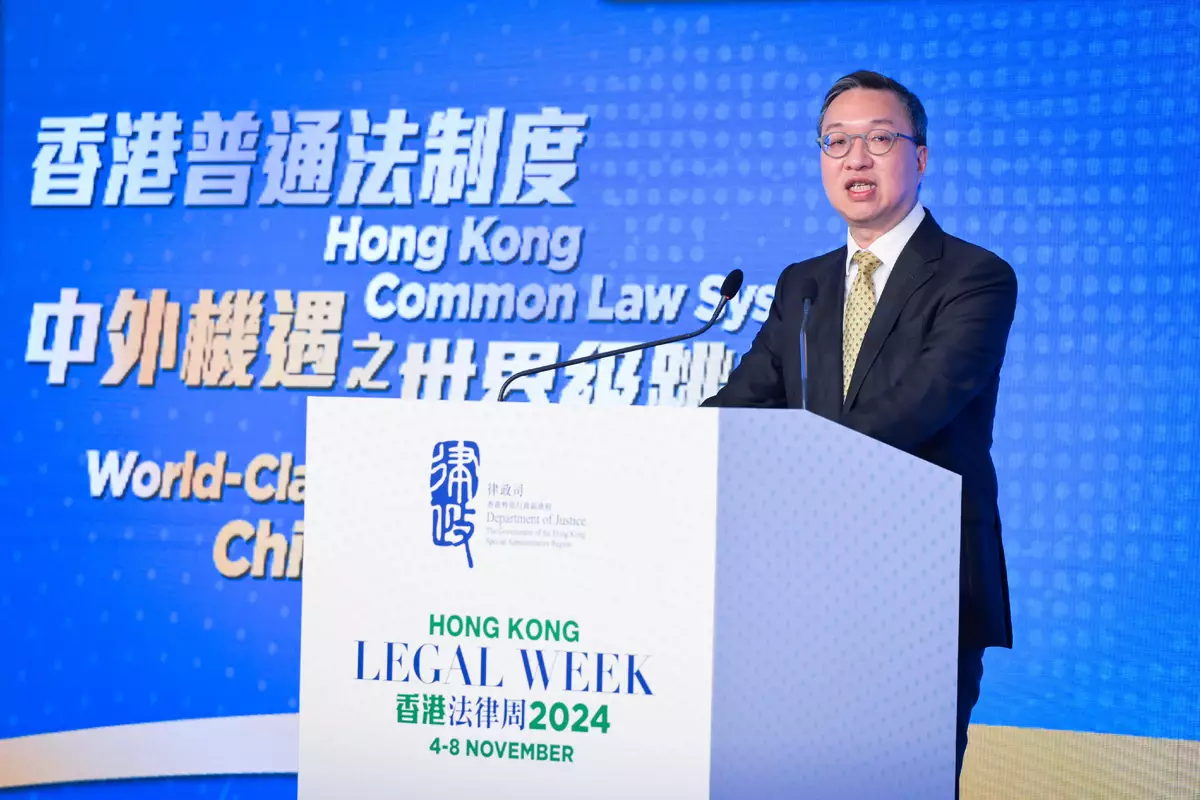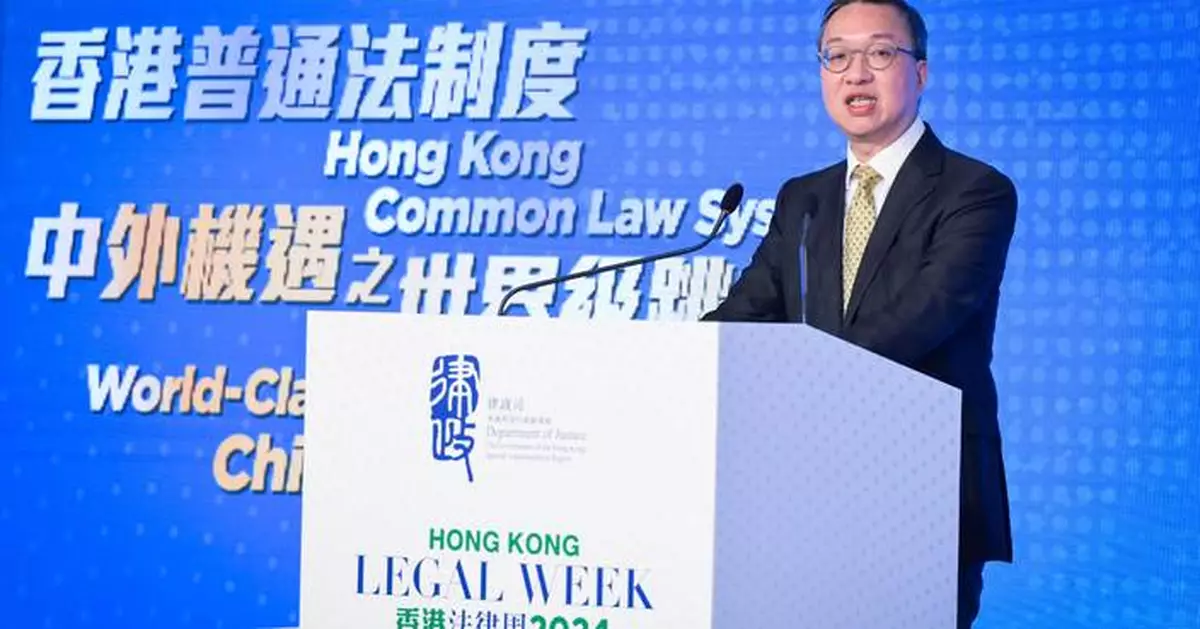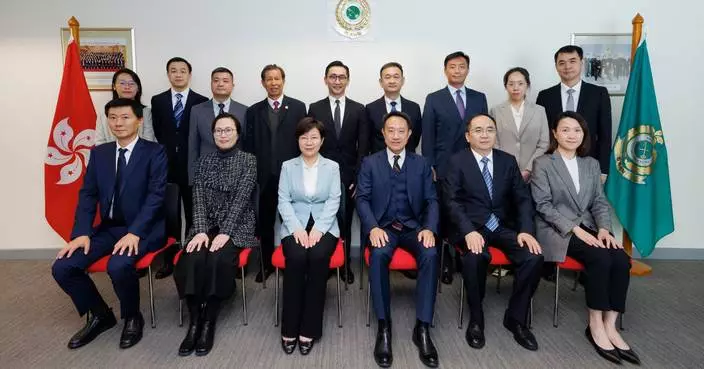Opening Remarks by SJ at Hong Kong Legal Week 2024: Rule of Law: The Best Business Environment (with photo/video)
Following are the opening remarks by the Secretary for Justice, Mr Paul Lam, SC, at Hong Kong Legal Week 2024:Rule of Law: The Best Business Environment today (November 8):
The Honourable Chief Justice Andrew Cheung (Chief Justice of the Court of Final Appeal), Vice Minister Wang Zhenjiang (Vice-Minister of Justice), distinguished guests, ladies and gentlemen,
A very good morning to all of you. On behalf of the Department of Justice of the HKSAR, I am delighted to welcome you to the fifth and final day of the Hong Kong Legal Week 2024.
Our theme this year is "Hong Kong Common Law System: World Class Springboard to China and Beyond". It highlights two fundamental points. First, Hong Kong's legal system is a common law system. It is the only common law system practised in China; and it is the only bilingual common law system using both Chinese and English in the world. Second, it serves and shall serve the vital function of helping people to explore and seise business and other opportunities not just in Hong Kong but also China as a whole and even other parts of the world by the provision of top quality legal services.
The correlation between the rule of law and economic development is beyond doubt. Hong Kong serves as the best example. In the Economic Freedom of the World 2024 Annual Report, Hong Kong reclaims the first position among 165 jurisdictions. The ranking depends on five main areas. One is legal system and property rights, which involves various indicators of how effectively the legal system protects people and their property; measures of judicial independence, impartiality of the courts, protection of property rights, the integrity of the legal system, enforcement of contracts, protection of real property, and police and crime. Two other main areas are first, freedom to trade internationally, which concerns mainly the presence or absence of trade barriers; and second, regulations which include regulations for credit market, labour market, business as well as competition. In the World Competitiveness Yearbook 2024, Hong Kong ranks the fifth. This is partly attributable to the fact that Hong Kong ranks first in the sub-topic of "Business Legislation".
Perhaps the most succinct and accurate statement describing the relationship between the rule of law and economic development is a famous statement made by President Xi Jinping, which is now often displayed in legal and other institutions in the Mainland. He said in Chinese "法治是最好的營商環境". Its English translation is indeed the theme of today's programme: "Rule of Law: The Best Business Environment". It is significant to note that in the Resolution of the Central Committee of the Communist Party of China on Further Deepening Reform Comprehensively to Advance Chinese Modernization adopted on July 18, 2024, one of the guiding principles is to "deepen reform and advance Chinese modernization under the rule of law".
Against this background, we are most honoured that Mr Wang Zhenjiang, Vice Minister of the Ministry of Justice of PRC, has come all the way from Beijing and will deliver a keynote speech on "Developments in our nation's Rule of Law and the role of Hong Kong's legal services industry". We have also set up an exhibition jointly with the Ministry of Justice of PRC in the opposite rooms showcasing the milestones and key features relating to the development of the rule of law of our country, and Hong Kong's contributions to it. I would strongly encourage you to take a look.
It should be borne in mind that Hong Kong's common law system is not merely serving the interests of Hong Kong people. It must be utilised to assist in achieving the overarching objective of the "one country, two systems" principle, which is to safeguard national sovereignty, security and development interests. The word that we hear most frequently in Hong Kong recently is "reform". The title of the Chief Executive's 2024 Policy Address is "Reform for Enhancing Development and Building Our Future Together".
While we must of course do our best to consider and make changes in order to rise up to new challenges and meet new demands due to the evolving objective circumstances, we shall not forget the fundamental principle of "守正創新"; in English "upholding fundamental principles and breaking new ground". To enable our common law system to serve the purpose that I have just mentioned properly and effectively, the precondition is that we must first maintain and reinforce the core features which render our common law system so unique and advantageous, many of which are indeed guaranteed by the Basic Law: for example, a bilingual legal system, a judiciary exercising independent judicial power without interference, zero tolerance for corruption, protection of property rights including intangible property such as intellectual property rights.
In line with the spirt of "守正創新", I am very pleased that the Honourable Mr Justice David Lok, who is now in charge of the Intellectual Property (IP) List in the Court of First Instance, will speak at the beginning of the first panel session on what Hong Kong has achieved in terms of IP protection and how to cope with challenges brought about by the advancement of technology in future. The significance of and contribution by our legal system to Hong Kong's success must be considered in a wider context and from different perspectives. In the two panel discussions this morning, you will also hear from not just eminent members of the two legal professions in Hong Kong, but also leading figures from both the public and private sectors, such as the Trade Development Council, Hong Kong Customs and Excise Department, ICAC (Independent Commission Against Corruption), Invest Hong Kong, and private companies, on the comprehensive regime in Hong Kong which provides a stable environment for business to grow and also some good stories of Hong Kong enterprises.
In the afternoon, we shall start by the launching ceremony of the Hong Kong International Legal Talents Training Academy. I will then say more on the significance of the Academy.
After that, the panel discussion will focus on the Belt and Road Initiatives. 2024 marks the beginning of the second decade of the Belt and Road Initiative (BRI) first announced in 2013. The ultimate goal of the BRI is to help build a global community of shared future. At the 9th Belt and Road Summit in early September in Hong Kong, the Vice Secretary General of the National Development and Reform Commission stated that Hong Kong shall strengthen its status as an international legal and dispute resolution services centre in the Asia Pacific region in order to assist in perfecting the foreign-related legal services required for the joint construction of the Belt and Road. In this last session today, experts from Hong Kong, the Mainland and overseas will consider how Hong Kong's legal talents may discharge such an important duty entrusted by the Central Authorities to Hong Kong.
In this respect, among other things, it is clearly necessary to enhance the collaborations between the legal professionals in Hong Kong and their counterparts in the Mainland. I am therefore very excited that, after the last panel discussions, I will witness the signing of a co-operation agreement between the Law Society of Hong Kong and the Xinjiang Lawyers Association.
After that, there will be a brief review of this year's Legal Week to be followed by my closing remarks.
Before I conclude, I would like to take this opportunity to thank all my colleagues of the Department of Justice for their dedication and hard work. I have extremely fortunate to have the support and assistance of my dear colleagues, who are both highly competent and passionate with a strong sense of solidarity. I would also like to express my deepest gratitude to our partners, moderators, speakers, exhibition helpers, co-organisers and supporting organisations, for making Hong Kong Legal Week 2024 possible. Finally, and most importantly, I must of course thank all participants, no matter whether attending physically including some who have travelled far to come here or watching us online. I wish you all a very insightful, fruitful and enjoyable day. Thank you very much!

Opening Remarks by SJ at Hong Kong Legal Week 2024: Rule of Law: The Best Business Environment Source: HKSAR Government Press Releases





